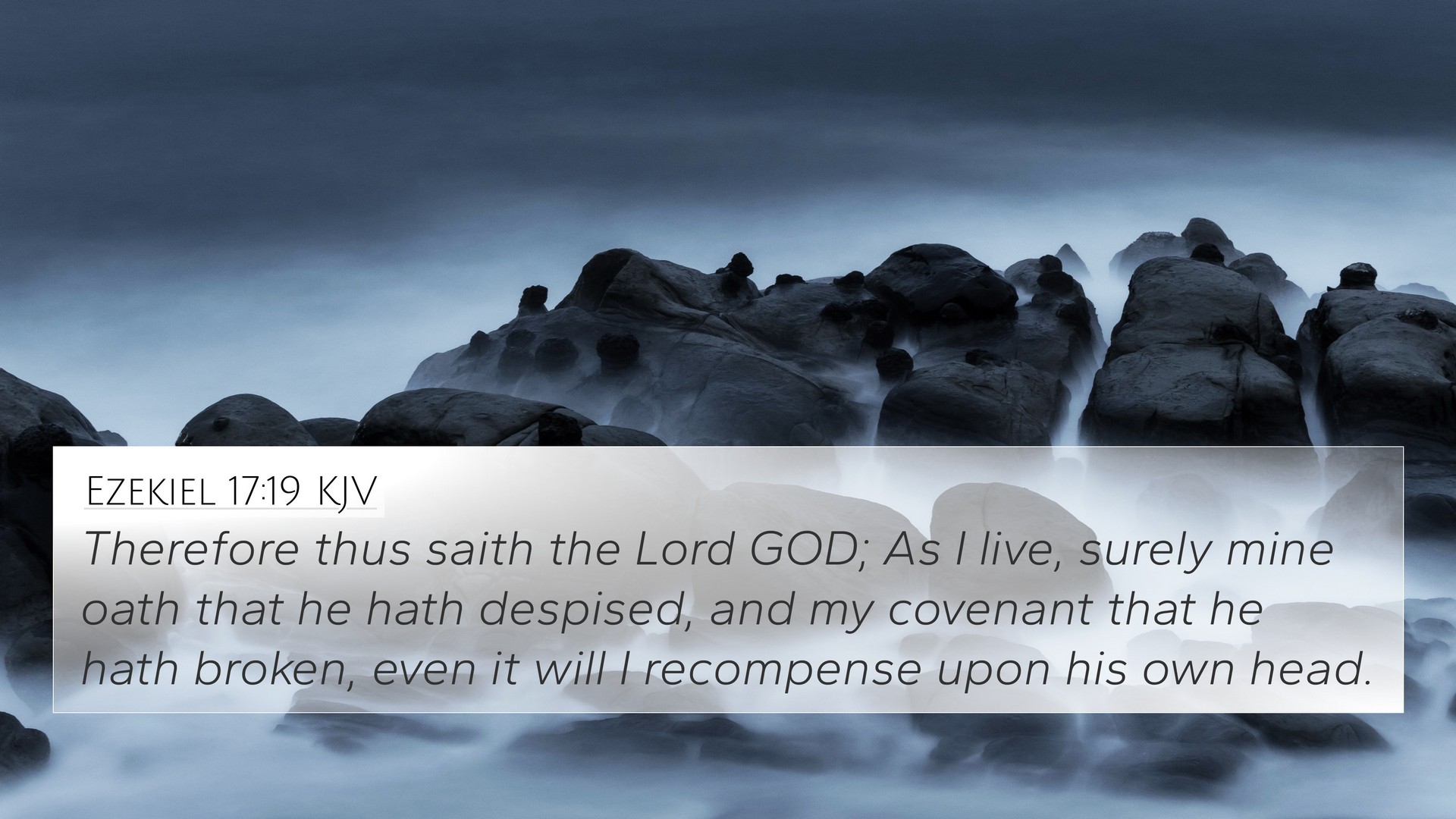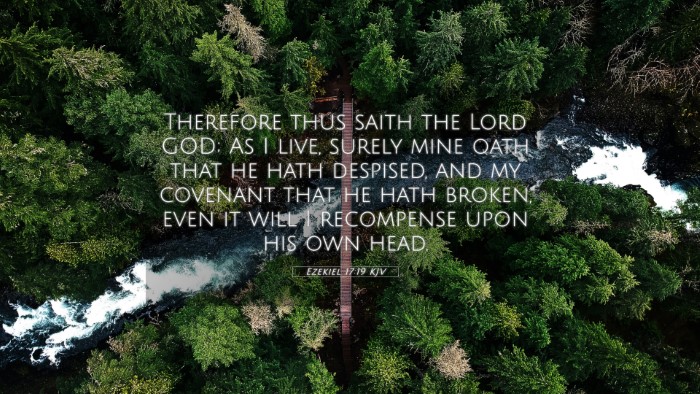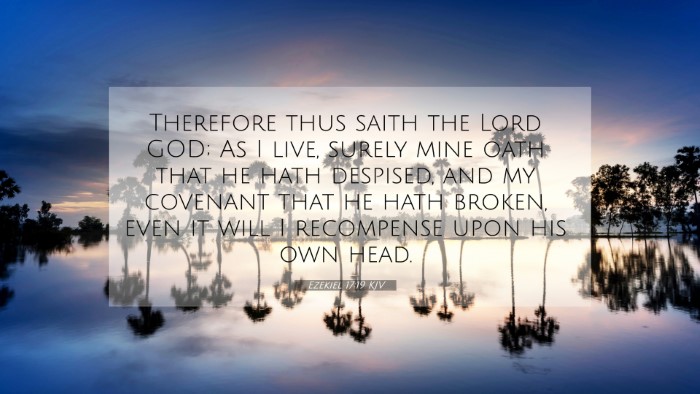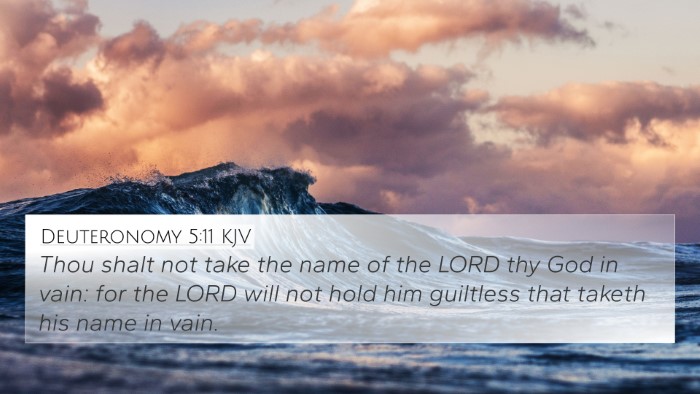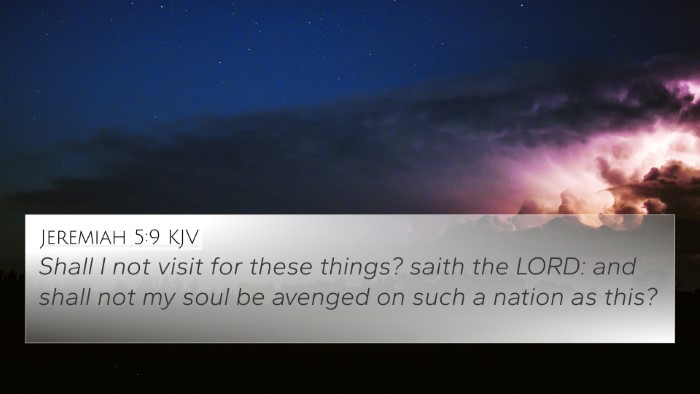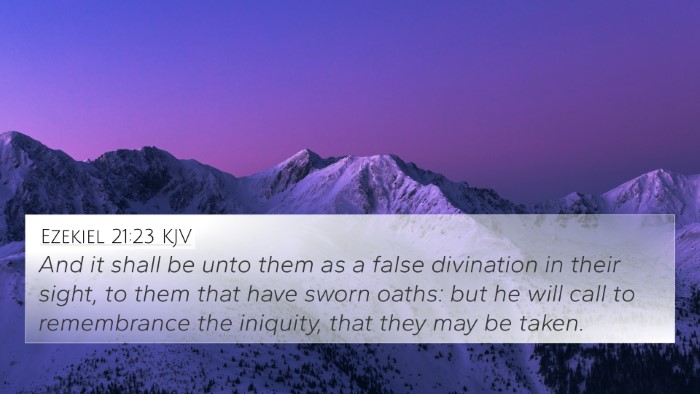Ezekiel 17:19 - Understanding the Verse
Ezekiel 17:19 states: "Therefore thus says the Lord God: 'As I live, surely My oath which he despised and my covenant which he broke, I will recompense on his own head.'" This verse presents a solemn declaration of God's intention to hold individuals accountable for their actions, particularly concerning the breaking of His covenant.
Summary of Insights from Public Domain Commentaries
This verse carries deep significance in the context of divine judgment and covenant faithfulness. The interpretations from Matthew Henry, Adam Clarke, and Albert Barnes join to provide a richer understanding:
1. Divine Accountability
Matthew Henry emphasizes that God will hold His people accountable for their disregard of His covenant. When a person shows a lack of respect for God’s promises, they place themselves under the judgment of God’s law.
2. The Nature of God’s Oath
Albert Barnes discusses the seriousness of God's oaths and covenants, noting that they are binding and come with consequences. When someone despises God's oath, they essentially reject His authority and pledges, which incurs divine retribution.
3. A Warning Against Despising the Covenant
Adam Clarke adds that this verse serves as a sober reminder that the covenant between God and man is not to be taken lightly. The consequences of breaking this covenant are dire, and one must understand the weight of their commitment to God's word.
Cross-References for Ezekiel 17:19
- Numbers 30:2 - "If a man makes a vow to the Lord, or takes an oath to bind himself by some agreement, he shall not break his word." This reference emphasizes the importance of keeping vows and oaths.
- Psalms 15:4 - "He who swears to his own hurt and does not change." This verse mirrors the commitment expected in covenants, highlighting integrity in promises.
- Jeremiah 34:18-20 - This passage shows God’s anger towards those who break their covenant, paralleling the message in Ezekiel 17:19.
- Hebrews 6:16 - "For men indeed swear by the greater, and an oath for confirmation is for them an end of all dispute." This New Testament verse connects the significance of oaths across the scripture.
- Malachi 2:14 - Here, God highlights His displeasure with those breaking their covenant with Him, similar in tone to Ezekiel's warning.
- Matthew 5:33 - Jesus speaks on the importance of honoring vows, linking the New Testament teaching back to Old Testament covenant principles.
- Romans 1:32 - This illustrates the consequences of sin, which can be seen as an indirect reference to breaking God’s covenant, as described in Ezekiel.
- Hebrews 10:28-29 - Speaking to the penalty for rejecting God’s covenant, emphasizing the seriousness of turning away from divine commitments.
- Ezekiel 18:30-31 - God urges His people to repent, reinforcing the call for accountability which resonates with Ezekiel 17:19.
- Matthew 12:36 - Jesus indicates that we will be held accountable for every word spoken, reflecting the theme of accountability in Ezekiel 17:19.
Thematic Connections
The verse provides a significant opportunity for a comparative Bible verse analysis. Notably, it draws connections between themes of covenant, accountability, and divine judgment across both the Old and New Testaments. This reflects a broader narrative about how God interacts with His people and the consequences of their faithfulness or unfaithfulness to His commands.
Tools for Bible Cross-Referencing
Utilizing a Bible concordance or a Bible cross-reference guide can facilitate a deeper understanding of how Ezekiel 17:19 connects to broader scriptural themes. This includes:
- Thematic Bible verse connections that establish faithfulness as a recurring principle in both the Old and New Testaments.
- A cross-reference Bible study approach to identify how God’s covenant is affirmed and challenged throughout the biblical narrative.
- Utilizing a Bible cross-reference system can enrich one's study and understanding of interconnected biblical truths. This promotes a comprehensive approach to interpreting scripture.
Conclusion
Ezekiel 17:19 serves as a stark reminder of the importance of respecting God's commands and the serious nature of His covenants. Through cross-referencing and careful study, one can uncover the rich tapestry of biblical themes connecting this verse with others, further illuminating the message of accountability and faithfulness throughout scripture.
